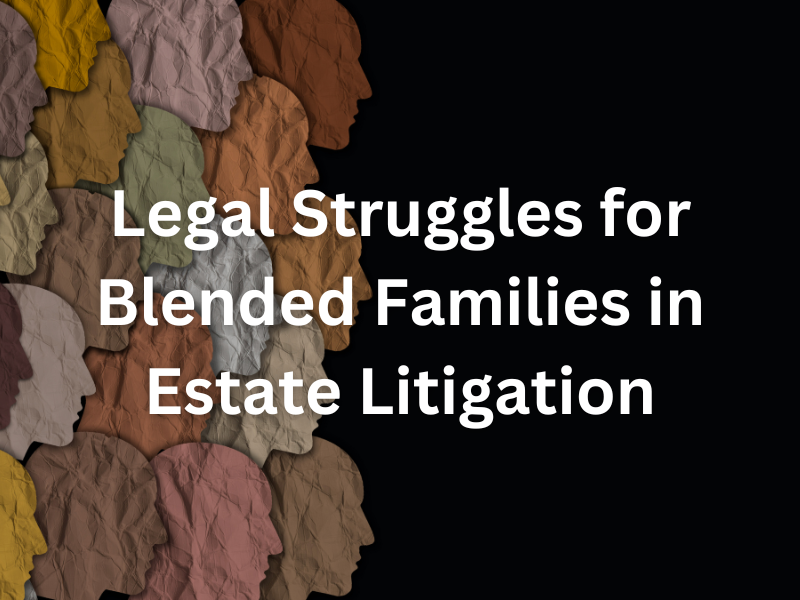
When a couple lives with children from their current relationship and from previous relationships, this is considered a “blended family.” According to various counts, 20% to 40% of American families headed by a married couple are blended families.
Being a child of a blended family can affect expectations and the reality of inheritances. There are multiple reasons that the revelation of the contents of a will or trust could disappoint a child or step-child of the decedent. These include failure to update the beneficiaries of a will or trust or the parent favoring one child over another.
A child who learns that a parent’s will or trust does not treat them as well as it treats other family members of their generation may have reason to contest the will or trust. A spouse or former spouse may have legitimate complaints about their treatment, too. Any interested party — not just children of the deceased — can contest a will or trust in California. As family ties become stretched, multiple disputes may arise from wills and trusts involving blended families.
There is a high burden of proof in estate litigation when you challenge the validity of a deceased individual’s will or a trust. If you think you have reason to contest a will or trust in California, you should consult an experienced probate litigation attorney as soon as possible. The probate litigation team at the law firm of Albertson & Davidson, LLP, exclusively handles matters of complex inheritance litigation and has earned a reputation for its lawyers’ aggressive courtroom skills. We will fight for you if your inheritance is at risk.
The estate litigation attorneys of Albertson & Davidson, LLP, serve clients throughout California from offices in Los Angeles, Bay Area, Orange County, and Silicon Valley. For your confidential consultation with a trust litigation lawyer, contact us today.
Litigation in Blended Family Estates: Key Issues
 Many inheritance disputes among blended families involve trusts or wills that have been prepared but not updated to reflect the new family ties.
Many inheritance disputes among blended families involve trusts or wills that have been prepared but not updated to reflect the new family ties.
Estate planning is the legal documentation of your desires for the handling and distribution of your assets after your death or if you become incapacitated. To ensure that your property and assets are distributed as you want them to be when you die, you need to have a last will and testament and, in some cases, a living trust.
Estate planning should be revisited and updated after major life changes, such a divorce or remarriage. For example, a will or trust that has not been updated could list an ex-wife as your beneficiary, allowing her to inherit assets that should go to your new wife and children of your later marriage.
Courts are very reluctant to overrule the legally stated wishes of the deceased. A properly executed and witnessed last will and testament may withstand challenges. Trusts are even harder to break. But if you have been improperly excluded from a loved one’s estate, it is reasonable to have our estate litigation attorneys review the will or trust documents and other legal documents on your behalf.
Contesting Wills in Blended Families
In California, anyone who would benefit or be affected by the outcome of probating a will has legal standing to contest the will’s contents. However, a person with standing must have legal grounds to base a will contest and then be able to demonstrate the validity of their claim.
Common examples and grounds for a family — blended or otherwise — contesting a will include:
- Lack of Capacity – An individual who establishes a will (the “testator”) must be of sound mind when they sign the will. They must understand what they are doing by establishing a will, understand their ownership of property and what it means to own property, and understand how they are related to a spouse, living descendants and parents, and others whose interests are affected by the will. A testator’s lack of capacity may be successfully challenged if medical records and testimony show they signed a will while mentally incompetent (such as suffering from dementia) or under the influence of a drug or alcohol. Advanced age, feebleness, or eccentricity are not grounds on their own for a lack-of-capacity claim in California.
- Undue Influence – Undue influence refers to one person taking advantage of a position of power over another person. When it is suspected that an elderly or infirm person’s actions have been guided by undue influence, we look at a family member, caretaker, or new companion who has taken a close interest in them while seeking to exclude others. Undue influence over the content of a will typically involves persuading the testator to distribute assets in a manner they would not have otherwise. Evidence would need to show that the deceased was subjected to pressure or manipulation that led them to act in a manner unlike their usual actions and that benefited or damaged a would-be beneficiary.
- Fraud – Deception or misrepresentation that caused the testator to agree to provisions in the will that do not reflect their true wishes is fraud. A will contest must be supported by proof of intentional wrongful or dishonest acts that influenced the decedent, not just evidence of motive or opportunity.
- A More Recent Will – If the deceased rewrote their will after remarrying or for any other reason, the newer document automatically supersedes all prior wills (unless it is successfully challenged). A new will should explicitly state that it replaces all previous wills, but this doesn’t always happen.
- Improper Execution – There are strict procedural requirements for the legal execution of a will. It must be in writing, signed by the testator, and attested to and signed by two competent witnesses. If a will does not fully conform to California statutory requirements, a will could be ruled invalid.
If a will is invalidated and no other legitimate will exists, the decedent’s estate will be distributed according to California’s rules for intestate succession. This begins by awarding half of all community property to the current spouse, which means all community property since they already own the other half. Children are next in line for inheritance under the laws of intestacy, and children the decedent legally adopted will receive an intestate share if there is no spouse, just as biological children will.
Stepchildren who were never legally adopted do not automatically receive an inheritance. They may receive inheritance if it can be proven that the decedent’s relationship with the child began while the child was a minor and continued throughout their lifetimes and that the decedent would have adopted the child if it had been legally possible.
Trust Litigation Concerns for Blended Families
There are considerations a typical blended family needs to make for trusts as well as for wills. By establishing a revocable living trust, an individual or married couple can turn over ownership of certain assets to the trust and direct trustees (themselves and/or others) or successor trustees (next-generation family members to distribute the trust’s assets according to their wishes.
Irrevocable trusts are often set up to distribute inheritance. Assets in a trust do not go through probate, as a will must, and are not bound by California intestate inheritance laws, which would be relevant if a will is ruled invalid.
But if you believe a trust does not reflect a deceased family member’s intentions, then contesting it in a California court is your right. Reasons to contest a trust and fight for your inheritance are similar to those for contesting a will:
- Lack of Capacity – The settlor’s inability to understand what they were doing by establishing the trust.
- Undue influence – Someone pressured or manipulated the settlor.
- Fraud – The trust was set up based on a third party’s deception or misrepresentation, or its administration is not according to trust bylaws.
- Self-Dealing – A trust may be challenged if someone who helped establish the trust (other than the settlor) will benefit from the trust.
- Invalid Execution – California law has specific requirements about signing a trust document to make it valid. If they have not been met, the trust may be invalid.
Protecting Rights in Blended Family Litigation
To contest a will or trust, you must be an “interested party.” Interested parties include:
- Any beneficiary named in the current will or trust or a previous will or trust
- A deceased person’s legal heirs under California’s intestacy laws of succession – spouse, children, parents, siblings.
- The deceased’s unpaid creditors.
An interested party would file a will or trust contest lawsuit in probate court for the California county where the testator or settlor lived. There must be a petition seeking to admit the will to probate (meaning the testator must be deceased) before you can contest the will.
The contest lawsuit would state the basis for challenging the will or trust and present physical evidence, such as letters, emails or other documents, and testimony that supports the lawsuit’s assertions. Many cases rely on expert testimony, such as from medical providers who can testify as to the decedent’s mental capacity.
There are several steps in the legal process before a trial when you challenge a trust or contest a will in California. Usually, the judge will order the parties involved in a suit to enter mediation to attempt to resolve their dispute without a trial. In mediation, a neutral third party works with the parties to a lawsuit and their attorneys to help them come to an equitable agreement and settle their differences without going to court.
Albertson & Davidson Can Help Resolve a Blended Family Dispute
 If your family members are involved in a dispute over the will, trust, or estate of a recently deceased loved one, an attorney with Albertson & Davidson LLP can help you fight for your inheritance. Our California estate litigation attorneys under California probate and estate law. We are experienced negotiators and hard-nosed litigators. Whether it’s a revocable trust matter for a blended family or a contested will, we can assess your case, advise you of your options, and represent you in court if necessary.
If your family members are involved in a dispute over the will, trust, or estate of a recently deceased loved one, an attorney with Albertson & Davidson LLP can help you fight for your inheritance. Our California estate litigation attorneys under California probate and estate law. We are experienced negotiators and hard-nosed litigators. Whether it’s a revocable trust matter for a blended family or a contested will, we can assess your case, advise you of your options, and represent you in court if necessary.
Our trust litigation lawyers focus on these types of complex estate disputes and have recovered more than $250 million in verdicts and settlements for deserving clients. Contact us today for a free and confidential consultation. Albertson & Davidson has law offices in Los Angeles, the Bay Area, Orange County, and Silicon Valley to serve clients throughout California. We stand. We fight. We win.

